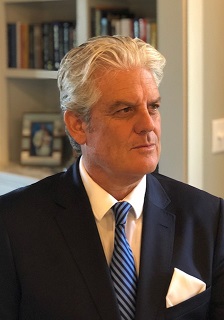From the CEO – May 2019
 Dear Clients,
Dear Clients,
Among the most frequently asked questions we receive from newer clients involves the cost of political risk on investments and how to predict and prepare for it. And more importantly, if political risk is almost ubiquitous now, affecting almost all markets, from developed to frontier, how can we price it?
From continued trade tensions between the US and China, to the recent European Parliament elections and the fate of any Brexit deal for the UK, to even some of the less ‘newsworthy’ political risk items affecting Cameroon, Algeria, and Mali, political risk – in its simplest form – refers to the risk that a government-related (in)action will negatively affect the cash flows of a firm(s) conducting an international or domestic investment.
One of the more favorable things PRS has at its disposal is that our data are consistently and independently back-tested by independent sources and have been since the early 1990s! As most of our clients already know, ICRG risk metrics have been strongly linked to returns in emerging market equities, the impact of commodity price shocks on the finance sector, the effects of inflation targeting on the choice of exchange rate regimes, real GDP growth, and to the cost of capital and investment valuation.
As a question posed at the outset, the latter finding is particularly useful. In a landmark study published in the Journal of International Business Studies (https://www.nber.org/papers/w19786), Bekaert, Harvey, Lundblad, and Seigel introduced the concept of the ‘Political Risk Spread,’ via the ICRG risk scores, for a new market-based measure of political risk derived from the yield spread between a country’s USD debt and an equivalent US Treasury bond. Consequently, the team was able to extract that part of a sovereign spread that was responsible for political risk (to avoid double-counting systemic country risk) and marry the results with standard approaches to investment based on the Net Present Value rule and the calculation of the discount rate!
What was even more enlightening was that the same study found both our PRS and ICRG risk scores were highly predictive. Not only did our risk metrics show marked deterioration over a four-year period preceding a risk event, but they correctly predicted a ‘risk news event’ using data on political risk claims and a unique textual-based dataset of ‘risk realizations.’
Finally – and this has been very significant for our government clients, especially those working with PRS’ Anti-Corruption and Investment Climate Group (ACIC) – the political risk spreads were linked to foreign direct investment (FDI) flows, showing that a 1% reduction in the political risk spreads was associated with a 12% increase in net inflows of FDI.
The effect of our rating changes on economic phenomena of importance to government is not confined to FDI: indeed, our ICRG Corruption and Law and Order (LO) scores have been linked to real GDP growth, with a more recent study conducted by Harvard University economist Robert Barro, who found that, after controlling for numerous variables, a rise in the measure of LO increases the annual growth rate on average between 2.1-2.4%. Going from the worst to best LO country scores increases a country’s growth rate by 1.6% percentage, annually. That is significant!
These sorts of findings are very important for governments because, as we see from this month’s risk reports, if political risk is anything, it is not in short supply in the world.
In one of Africa’s hotspots, security services in Cameroon have been deploying the tactics of a repressive state, quenching the thirst for democracy to reinforce presidential authority and deflect attentions from a deadly standoff between the majority Francophone and minority Anglophone communities prompting unrest in the northwest and southwest regions. Separatists there remain hellbent on establishing a new independent state called Ambazonia that state authorities are in no mood to agree to, but are far from united in their quest, with the group leader, Julius Ayuk Tabe, still in prison, facing a challenge from Samuel Ikome Sako.
Relief agencies estimate that 1,850 people have died in the clashes that have descended into outright conflict between the state military and local militia, and are showing no sign of immediate resolution with the government rejecting offers of outside help as sovereign interference – a stand-off that is increasingly making Cameroon’s allies uneasy.
Looking north to Libya, General Khalifa Haftar, the leader of the Libyan National Army (LNA), which has served as the official military force of the Tobruk-based government for three years, will be hard-pressed to seize control of the entire country, as the diversion of forces northward to Tripoli will weaken the LNA’s ability to hold positions recently taken in the south of the country. Indeed, there is a not insignificant threat that the focus on Tripoli will give the Islamic State (IS) an opportunity to stage a comeback.
A somewhat more benign situation exists in Italy, despite continued tensions in the governing coalition. Although the fiscal deficit narrowed to 2.1% of GDP in 2018, and the government dampened market fears by eventually reaching an agreement in December with the European Commission over its public spending plans, the EC’s latest forecasts indicate the general government deficit will rise to 2.5% of GDP this year and the government will miss the 3% of GDP EU target by a wide margin in 2020, coming in at 3.5% of GDP without any corrective measures, which will spark another intense round of negotiations while resulting in Italy incurring the excessive deficits procedure.
The new forecasts are much higher than expected, and reflect the government’s commitment to a citizens’ income, and increases in pensions with the added uncertainty over the revenue stream. Given the weak growth traced out for Italy’s economy, the primary surplus falls short of that required to stabilize the debt ratio, the structural deficit increases, and the gross debt burden rises to 135% of GDP in 2020.
Finally, as Tunisia prepares for parliamentary elections that will be held on October 6, to be followed by a presidential election in November, the political climate can be fairly described as fraught. The survival of Prime Minister Youssef Chahed’s reformist government has once again been thrown into doubt by rising pre-election tensions between secular political forces and the moderate Islamist Renaissance Party (Ennahda), which is currently the single largest party in the 217-member Assembly of the Republic of the People (ARP) with 68 seats.
Real GDP growth is forecast to slow to 2.4% this year, and the negative implications for fiscal stability of below-target growth will likely be reinforced by overspending in advance of the elections. The failure to hit the fiscal target will put pressure on the new government to take immediate corrective action, and will heighten the risk of a suspension of IMF support if the fragmentation of parliamentary support poses a significant obstacle to securing approval of key budget measures.
I recently participated in a thoroughly enjoyable and exquisitely planned two-day conference in Nur-Sultan (formerly Astana) in Kazakhstan. The 12th Annual Astana Economic Forum hosted speakers and delegates from over 30 countries, and included the likes of IMF Head, Christine Lagarde, Jeffrey Sachs, Armenian Prime Minister Nikol Pashinyan, First President of Kazakhstan Nursultan Nazarbayev, among others.
Panel discussions ranged from efforts to further regional integration, to digitization (in its various forms), to the role of ratings agencies in attracting foreign capital to Kazakhstan. I spoke on a panel on the latter and emphasized a number of key trends among the ‘raters’ as it were. A copy of the panel discussion will be available soon on PRS’ Insights/Au Courant blog. Be sure to subscribe.
We are also beginning a working relationship with the government of Sierra Leone as the country seeks to provide a more inviting climate for foreign capital, which includes efforts to eradicate corruption.
A similar effort is underway with the Republic of Georgia, who has asked us several times in the past to incorporate the country into the ICRG ratings and scores. During the Astana conference I had a chance to speak with Prime Minister Bakhtadze about ICRG and matters relating to the country. The need for an expanded ICRG is clear. Wait for news on this development next month.
The forthcoming book on political risk – co-edited and written with Peter Marber – titled ‘Quid Periculum: Measuring and Managing Political Risk in the Age of Technology’ is progressing well and should be ready for order in the early fall. Please contact the PRS Office in NY for details.
We are also planning on showcasing some of the main findings of the book at this year’s annual RiskMinds International Conference (https://finance.knect365.com/riskminds-international/) in Amsterdam in December. The five-day event is the world’s largest for those involved in the risk business, including buy-side investment firms, financial institutions, academics, and the like. Don’t miss this one.
Finally, May was also a busy month for our ICRG index, with some 75 countries (over half the ICRG universe of country coverage) having their risk profiles adjusted, affecting over 100 political risk metrics.
Thanks for your continued support, and please contact us if we can be of any assistance.

Chief Executive






